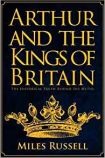Arthur and the Kings of Britain: The Historical Truth Behind the Myths by Miles Russell
As the author of the Historia Regum Britanniae (History of the Kings of Britain), written in 1136, Geoffrey of Monmouth is commonly recognized as one of the first British historians. His book told – or is supposed to have told - the story of the British monarchy during the Dark Ages, from the arrival of the Trojan Brutus, grandson of Aeneas, up to the seventh century AD when the Anglo-Saxons had taken control of Britain. Being virtually the only work of its kind at the time, it proved very influential, and became well-known throughout western Europe as one of the great works of medieval literature as the first retelling of the story of King Arthur, Lear and Cymbeline. Shakespeare was forever in his debt with regard to the two latter.
| Arthur and the Kings of Britain: The Historical Truth Behind the Myths by Miles Russell | |
|
| |
| Category: History | |
| Reviewer: John Van der Kiste | |
| Summary: As the author of the Historia Regum Britanniae (History of the Kings of Britain), the story of the British monarchy during the Dark Ages up to the seventh century AD, written in 1136, Geoffrey of Monmouth is commonly recognized as one of the first British historians. It is inevitably part fact and part legend, and Russell's book is a solid monument to his research in distinguishing one from the other. | |
| Buy? Yes | Borrow? Yes |
| Pages: 336 | Date: March 2017 |
| Publisher: Amberley | |
| ISBN: 9781445662749 | |
|
| |
Although it passed for history in its time, by modern standards it has long since been regarded as medieval propaganda and a collection of national mythmaking. It has taken extensive research by noted archaeologist Miles Russell to evaluate the sources of fact and myth, and demonstrate how individual strands of the Historia can be traced back to the first century BC, the era when Britain was closely linked to the Roman empire. Geoffrey of Monmouth brought these together with existing folk legends passed down largely by oral means from one generation to the next, and material culled from such post-Roman sources as were available. The result was a chronicle which laid the foundations for several centuries of ancient history or to be more accurate half-truth, and at the same time the creation of King Arthur, who was in fact a composite character, his story whose real origins and context are explained here.
Was there ever a real King Arthur? The impression is that he was a warlord of the fifth of sixth century, a mythical figure whose life story such as it is has been constructed from or based on the lives of other semi-legendary characters of the time. Russell accepts that Geoffrey of Monmouth's account is unreliable – could we expect it to be otherwise? – and that he has embroidered the most sketchy of knowledge that was available to produce a moderately plausible history. There is a fine line between 'peddling historical fiction' and preserving the earliest foundation myths of the nation.
Despite the book's title, it is not solely concerned with the Arthurian legends, but starts several centuries earlier. Geoffrey begins his saga during the first century BC, with the Roman invasions under Julius Caesar. For this we also have Caesar's own histories, and although there is much truth in the saying that war histories are generally written by the victors, one can assume that his version of events is basically an accurate one. Caesar and other Roman historians therefore provided the British historian with some source material to add to the myths and legends, up to the early fifth century when officials in Britain rebelled against the Roman Emperor Constantine II, 'taking the island out of the Roman Empire for good'. (Was this the first Brexit, over 1500 years ago?) Readers will also be interested in the story of the (perhaps real, or more real) story of King Leir (note the different spelling). Shakespeare's play took considerable licence with Geoffrey's version of events; for example, in the latter, far from dying from grief after Cordellia is hanged, the King predeceases her and she later takes control of the kingdom inherited from her father.
Russell's book is a solid monument to his research in a much-obscured era of history. Nobody expects a clear-cut volume of individual histories of the early sovereigns. What we do have is a very interesting picture of the first few centuries, and the sovereigns of whom very little is known for certain, but the pieces of the jigsaw are drawn together very well.
For further reading, the Arthurian legend is dealt with very readably in two books ideal for children and adults alike, The Classic Guide to King Arthur (Classic Guides) by Dr Keith Souter and The Sword in the Stone by T H White, while, departing from British shores, The Ruin of the Roman Empire by James J O'Donnell is also of interest and some relevance.
Please share on: ![]() Facebook,
Facebook, ![]() Twitter and
Twitter and
![]() Instagram
Instagram
![]() You can read more book reviews or buy Arthur and the Kings of Britain: The Historical Truth Behind the Myths by Miles Russell at Amazon.co.uk Amazon currently charges £2.99 for standard delivery for orders under £20, over which delivery is free.
You can read more book reviews or buy Arthur and the Kings of Britain: The Historical Truth Behind the Myths by Miles Russell at Amazon.co.uk Amazon currently charges £2.99 for standard delivery for orders under £20, over which delivery is free.
![]() You can read more book reviews or buy Arthur and the Kings of Britain: The Historical Truth Behind the Myths by Miles Russell at Amazon.com.
You can read more book reviews or buy Arthur and the Kings of Britain: The Historical Truth Behind the Myths by Miles Russell at Amazon.com.
Comments
Like to comment on this review?
Just send us an email and we'll put the best up on the site.

